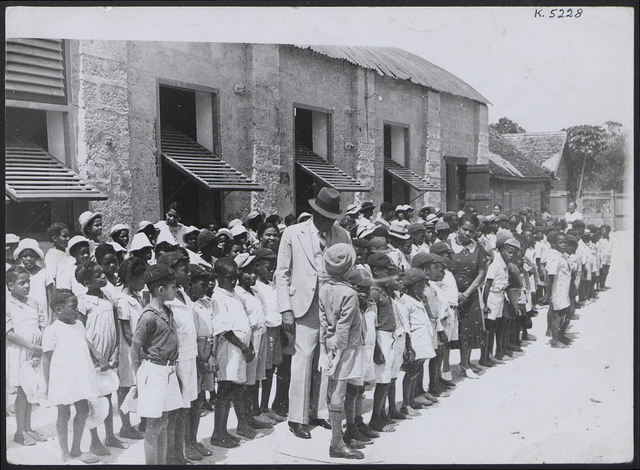Reproductive Rights and Race Struggle in the Decolonizing Caribbean

On May 27, 1935, hundreds of Bermudians gathered in a protest chaired by barrister David Tucker, member of the League of Coloured Peoples and editor of the local Afro-Bermudian Recorder newspaper. The subject of the meeting was a new “Report on Unemployment” put forward by the local House of Assembly, a body composed almost entirely of members of the British colony’s white male elite. Like many before it, the report avoided a discussion of the island’s reactionary economic policies and lack of a social safety net, blaming declining fortunes instead on the “indolent and inefficient” labor force.1 However, the committee went a step further than usual in its audacious proposals. Claiming that the high unemployment rate resulted directly from unrestricted reproduction, legislators called for the dissemination of birth control, the legalization of voluntary sterilization, and the compulsory sterilization of “mental defectives,” women who mothered two illegitimate children and men who fathered one illegitimate child.
The logic underlying the report was not unique to Bermuda. In the context of rising population growth rates, economic depression, and labor unrest, theories that located population growth as the cause of poverty and discontent gained increasing currency across Britain’s Caribbean/Atlantic colonies in the 1930s. Campaigns to increase access to contraceptives (namely diaphragms and spermicidal foams/powders) also spread internationally in the early twentieth century, drawing in an eclectic mix of socialist, feminist, neo-Malthusian and eugenicist activists. Compulsory sterilization proposals had become law in over a dozen countries by the 1920s-30s, which targeted people with disabilities, individuals on welfare, and/or members of marginalized communities. The Bermudian report cited contemporary legislation in the United States and Germany, in particular, as potential models to follow.
The Afro-Bermudian community quickly recognized the underlying implications of the proposals on an island where reports suggested that rates of “illegitimate” children (those born outside of marriage) were significantly higher amongst black families. As Mr. John Tucker argued at the protest meeting, “They [the sterilization proposals] will hurt the coloured people more than the white…I am going to be frank…it will decrease our population if the measure is carried through, and that is one of the motives aimed at.” Schoolmistress Miss Adele Tucker expressed her disgust that “men in power, supposed to represent the community, should represent them in this way,” and David Tucker argued that the “ruthless proposals” made “the effort of Hitler to ‘purge’ the German nation seem tame.”2

Bolstered by a unique alliance of religious leaders, citizens’ associations, and the Bermuda Woman Suffrage Society, this mobilization forced the House of Assembly to retract the proposals within weeks. But black communities around the Atlantic remained on guard in the years to come. The threat of sterilization in Bermuda became the subject of meetings of several Caribbean immigrant associations in New York and London in the following years, articles in the transnational Negro Worker, and a solidarity protest amongst a group of Afro-Guyanese activists in March of 1937. Local labor activists and branches of the pan-Africanist Universal Negro Improvement Association (UNIA) also continued to highlight the threat of racial eugenics in the 1940s.
This mobilization played a critical role in ensuring the rapid defeat of similar proposals put forward by local legislatures in Barbados and Jamaica in the late 1930s. It also prevented the Colonial Office from implementing a state birth control scheme and kept communities on the defensive against reproductive coercion. However, the linking of “birth control” to sterilization by many black leaders—and specifically, to state-imposed, racially motivated eugenic sterilization—also created problems for those who sought to promote contraception under other rationales. This included a number of Caribbean social workers, doctors, nurses, and activists who had seen firsthand the burden frequent childbearing could place on working-class families. As Barbadian social worker John Beckles argued in 1941, while birth control was not “the immediate solution to a problem which is largely economic,”3 it could provide some practical help for those already struggling to make ends meet. For nationalist leaders like Jamaican Norman Manley, Barbadian Grantley Adams, and Trinidadian Eric Williams, access to birth control was both an aid to island development and a question of individual liberty.
A handful of commentators explicitly connected access to birth control with women’s health and rights. This included Maymie “Madam de Mena” Aiken, a prominent UNIA organizer from the U.S. domiciled in Jamaica since 1935. Aiken related stories of sick mothers struggling for survival or resorting to illegal abortion to limit their families. She argued that through birth control clinics “women will acquire a general knowledge of the care of their bodies… which would be a great contribution to family welfare. Why not give a fair chance to every child that is born; and the right to every woman of voluntary parenthood?”4

Fellow pan-Africanist women’s activists like Amy Bailey and Alma Labadie supported her position, but their male colleagues within the UNIA issued harsh condemnations and accused them of contributing to “race-destruction.”5 The UNIA’s pro-natalist philosophy in part informed their opposition; as activist St. William Grant stated simply, “Mr. Garvey was no advocate of birth control, and if he were alive he would not support it.”6 But Aiken also called out the male bias that allowed her colleagues to privilege the race struggle over women’s bodily self-determination. According to Aiken, “nearly every woman who is a mother will agree that the subject of Birth Control is of very little interest to the selfish man.”7
The men who did support access to contraception also came under attack from the 1940s-60s, as reproductive practices became entangled in the local political struggles that shaped the transition from local self-government to federation to independence. Alexander Bustamante’s Jamaica Labour Party accused Manley of advocating “the destruction of the race.”8 For E.D. Mottley in Barbados, birth control was nothing short of “racial supremacy or bigotry”9 on the part of the white and light-skinned elite. Slogans like “Birth Control a Plot to Kill the Negro”—scrawled on walls in Kingston in the mid-1950s—served to bring this message to a broader audience.
Meanwhile, private family planning associations—notably multiracial in their composition—began to set up clinics to distribute birth control for free/at cost. Within a year of opening in 1939, the Jamaica Birth Control League received some 500 letters from working class women who made explicit their demand for birth control, highlighting their deteriorating physical health, mental exhaustion, and economic constraints. Similar experiences in Barbados and Trinidad, highlighted by ardent local activists, even helped push a post-independence Bustamante government to support birth control services. By the mid-1970s, almost all Caribbean islands had invested heavily in state family planning programs, fueling a rapid growth of contraceptive clinics and contributing to dramatic declines in birth rates across the region.
As in other areas of the world, these state family planning programs did not always provide the empowerment they promised. Records suggest that women were sometimes pressured to use long-lasting methods like the IUD or Depo-Provera due to biases against their ability to “contracept” effectively or as a result of pressure from international aid organizations to meet insertion targets for these methods. But in drawing attention to the coercion that has shaped the history of birth control promotion in black communities, we also need to remember the damage that can be wrought by a lack of services. As Trinidad’s People’s National Movement pointed out in their 1965 “Report on Family Planning:”10
[I]f people are to be free to make a choice they must have a choice to make. There is no choice available to people who have never heard of contraception, or if they have heard do not know where to go to learn about it. There is no choice available to the poor in areas where no subsidised or free services are provided…It is certainly not the business of the State to force any of its citizens to use birth control, but while it does not offer it, it forces many of them not to use it.
Indeed, the story of birth control in the decolonizing Caribbean vividly illustrates the importance of contemporary approaches to reproductive justice, which stress the right to both have and not have children under safe conditions and with access to the resources needed to fulfill those rights. The principle of bodily autonomy and centering of women’s experiences undergird these approaches, as Aiken suggested some 70 years ago.
- “No.75: Report on Unemployment,” 15 May 1935, Journals of the House of Assembly of Bermuda: Session 1934-35, BA, 280. ↩
- “Country-Wide Protest Against the Unemployment Report,” The Recorder, 1 June 1935, 1.; “After Us, the Deluge!” The Recorder, 25 May 1935, 2. ↩
- John Beckles, “Letter to the Editor,” Barbados Advocate, 20 June 1941, 6. ↩
- Maymie L. Aiken, “Letter to the Editor: Birth Control,” Daily Gleaner, 8 September 1939, 10. ↩
- “Editorial: Birth Control or Extermination of the Blacks—Which?” New Negro Voice, 31 January 1942, 4. ↩
- “Over One Thousand Flock Liberty Hall,” New Negro Voice, 24 January 1942, 5. ↩
- Maymie Aiken, “Letter to the Editor,” Daily Gleaner, 8 September 1939, 10. ↩
- The Jamaica Labour Party, “The Truth,” Daily Gleaner, 7 December 1943, 4. ↩
- “Supplement to the Official Gazette, Vol 85, LXXXIX” (“Supplement to the Official Gazette, Vol. 59, No. XC,” 25 July 1955 (Supplements to the Official Gazettes, 1937-1955, BNA), 79. ↩
- A Committee of the General Council, “People’s National Movement: Report on Family Planning,” 40-41. ↩

Birth control has always been a double- edged sword. But as I contemplate, it occurs to me that the woman’s body produces an egg every month, which, if not fertilized is discarded through the menstrual cycle. It’s a natural process that never enters the debate about Birth control, which leads me to believe that it’s not a debate about birth, only control. The State, which is primarily a male institution, places economic woes in the womb in order to avoid any attack on male sexual license. It’s a centuries old argument that we must continue to have. This article does just that. Thank you.